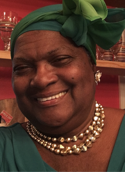By Terrell Parker, NMAC Associate Program Manager
History is best told by those who lived it. However, so much of the early history of Black people in the movement has been shrouded in secrecy due to shame and stigma. This year, for Black History Month, we are exploring the Black community’s impact on ending the epidemic by highlighting the Black History makers in HIV Past, Present, and Future.
 Dr. Joyce Turner Keller is a 68-year-old HIV-positive woman, who resides in Baton Rouge, Louisiana. She is the Founder & CEO of ASPIRATIONS, a nonprofit HIV service organization, and an artist, advocate, community organizer, motivational speaker, writer, actress, producer, and director. She has served as CEO of Positive Diva and Positive Dude Productions, and Spiritual Leader of the Travelers Of Christ Evangelistic Ministry for 53 years.
Dr. Joyce Turner Keller is a 68-year-old HIV-positive woman, who resides in Baton Rouge, Louisiana. She is the Founder & CEO of ASPIRATIONS, a nonprofit HIV service organization, and an artist, advocate, community organizer, motivational speaker, writer, actress, producer, and director. She has served as CEO of Positive Diva and Positive Dude Productions, and Spiritual Leader of the Travelers Of Christ Evangelistic Ministry for 53 years.
What made you join the fight?
After I was diagnosed with AIDS in November of 2001, I thought it was critical that my community should see someone like me publicly living with and speaking out about the a pandemic of new infections and the risk of becoming HIV-positive. I wanted them to know HIV did not ask for a resume.
Who were the leaders in HIV that you remember the most from the early days of the movement?
The leaders I remember in the early days of my fight are Myron Solomon, Shirley Lolis, A.J. Johnson, Phill Wilson, Frank Oldham, Paul Kawata, Charles King, Larry Bryant, William “Bill” Arnold, Christopher Bates, Nancy Wilson, and Eugene Collins.
Is there anyone who you looked up to as a mentor?
A. J. Johnson of BRASS , William “Bill” Arnold, Frank Oldham, and Circe LeCoompte
What hadschanged the most about HIV from when you were first diagnosed to now?
The local activity is not as visible and events are not as plentiful. The message of advocacy is not supported as strongly.
In what ways have you been a part of history?
I am a part of the History of HIV as a visible advocate. I use art, community organizing, and theatre to address stigma in churches. As a minister I am inclusive of all genders, race, and religion. I am a part of History because of my written and spoken words of injustice and discrimination.
What is your biggest accomplishment working in the fight to end HIV?
My biggest accomplishment working to end HIV is helping to eliminate stigma, educate and test for HIV, share my experience as a professional, heterosexual minister and Black woman, and have my voice heard on a global level in PSAs and documentaries.
What advice would you give to the next generation of leaders fighting to end HIV?
The fight to end HIV will take all of us. I will tell the next generation that they are a value that cannot be compared to any other source, for we need their vision and passion to move forward and win this war.